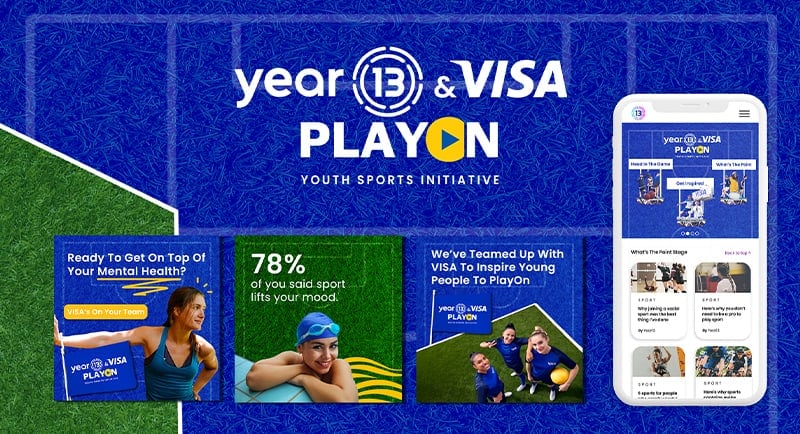New research conducted by digital youth engagement platform Year13 in partnership with Visa reveals that age 15 is Australia’s peak age for girls dropping out of sports, with lack of role models, body confidence, and conflict with study all playing a role.
The research revealed the importance of visible role models as 60% of young female respondents said they didn’t have a female sports star they looked up to. One in five (20%) girls also say they’ve never (or can’t remember) the last time they saw women’s sports highlights in media. Real and relatable role models were shown to be more important than ever with almost a third (31%) of young girls who do not play sports dropping out due to bodily insecurities.
The importance of family influencing participation in sports and providing exposure to role models was also highlighted. Parents were the second most influential group on the decision to play (behind only “friends”). However, nearly 70% of girls have no parents who currently play sports and almost two thirds (62%) of Australian girls say their family rarely or never watch women’s sports.
Visa and Year13 have launched Year13 & Visa PlayOn, a new initiative to boost awareness of the benefits of sport on and off the pitch, and provide access to role models like young footballers Ellie Carpenter and Claudia Bunge, and Olympic gold medalist shot putter Dame Valerie Adams. The platform will also showcase content and advice from role models with careers in different industries such as music and the arts who will share the role that sport plays in their lives and why it’s important to them.
Australian footballer Ellie Carpenter commented: “As a young girl, juggling everything in my life with my passion for sport was sometimes challenging but not only has sport given me a career, it has also given me so much more – from confidence and resilience to lifelong friends. I’m proud to be a Team Visa athlete and hope I can play a role in encouraging girls to stay in sport”.
Visa and Year13’s research also showed that nearly half (48%) of girls who have stopped playing sports cite needing more time to study (the #1 answer) as the reason why they do not play, compared with 30% of boys. Further, only a quarter (25%) of young girls currently believe playing sports helps with skills for work, despite saying it can help with teamwork (91%) resilience (77%), collaboration (73%), discipline (71%) and leadership (70%). Additionally, benefits reported by young girls who did continue to play sports included its ability to clear their mind, lift their mood, give them energy, improve productivity, and help them sleep.
Visa’s head of marketing for Australia, New Zealand and South Pacific, Natalie Lockwood said: “We know that playing sports builds transferrable skills that can set girls up for success, including in business, with a study showing 94% of female CEOs have played a sport. The story behind the numbers is we need to ensure our girls understand these links and have access to positive role models that encourage them to stick with sport. Through Team Visa we are focused on championing women in sport and now with Year13 & Visa PlayOn, we look forward to supporting the next generation. The FIFA Women’s World Cup 2023 will help ignite this excitement around women’s sport, and our goal is to be part of a long-term solution that endures long after the tournament has concluded.”
Year13 co-founder and co-CEO Saxon Phipps said: “There is a huge opportunity to reframe the way we talk to young girls about sport, as something that can actually help not just with study, but with relationships, mental health and all sorts of life and professional soft skills and we’re excited to partner with Visa to drive this conversation and grassroots participation by showcasing these inspiring role models on the Year13 & Visa PlayOn platform. Through this initiative, we’re encouraging parents and schools to speak with their children and students about staying in sport in their final years of school and beyond, instead of giving it up when most do by 15.”
See Also: Year13: New kids on the digital media block cutting through to Gen Z
